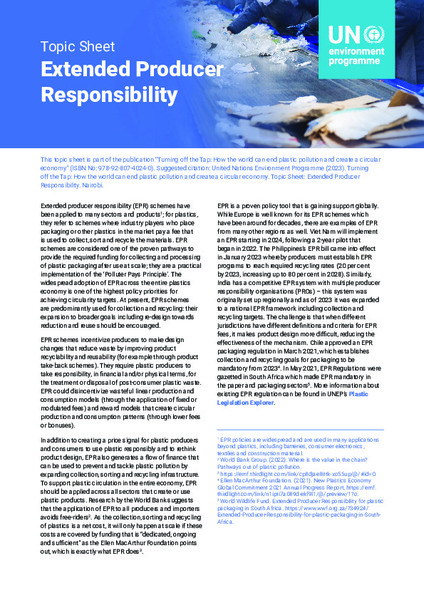| dc.contributor | Industry and Economy Division | en_US |
| dc.contributor.author | United Nations Environment Programme | en_US |
| dc.date.accessioned | 2023-04-20T21:41:00Z | |
| dc.date.available | 2023-04-20T21:41:00Z | |
| dc.date.issued | 2023-05 | |
| dc.identifier.uri | https://wedocs.unep.org/20.500.11822/42235 | |
| dc.description | Extended producer responsibility (EPR) schemes have been applied to many sectors and products; for plastics, they refer to schemes where industry players who place packaging or other plastics in the market pay a fee that is used to collect, sort and recycle the materials. EPR schemes are considered one of the proven pathways to provide the required funding for collecting and processing of plastic packaging after use at scale; they are a practical implementation of the ‘Polluter Pays Principle’. The widespread adoption of EPR across the entire plastics economy is one of the highest policy priorities for achieving circularity targets. At present, EPR schemes are predominantly used for collection and recycling: their expansion to broader goals including
re-design towards reduction and reuse should be encouraged. | en_US |
| dc.format | pdf | en_US |
| dc.language | English | en_US |
| dc.relation.ispartof | Turning off the Tap: How the World can End Plastic Pollution and Create a Circular Economy | |
| dc.rights | Public | en_US |
| dc.subject | circular economy | en_US |
| dc.subject | recycling | en_US |
| dc.subject | producer liability | en_US |
| dc.title | Topic Sheet: Extended Producer Responsibility | en_US |
| wd.identifier.sdg | SDG 3 - Good Health and Well-Being | en_US |
| wd.identifier.sdg | SDG 12 - Responsible Consumption and Production | en_US |
| wd.topics | Chemicals and Pollution Action | en_US |
| wd.topics | Finance and Economic Transformations | en_US |
| wd.identifier.pagesnumber | 5 p. | en_US |


